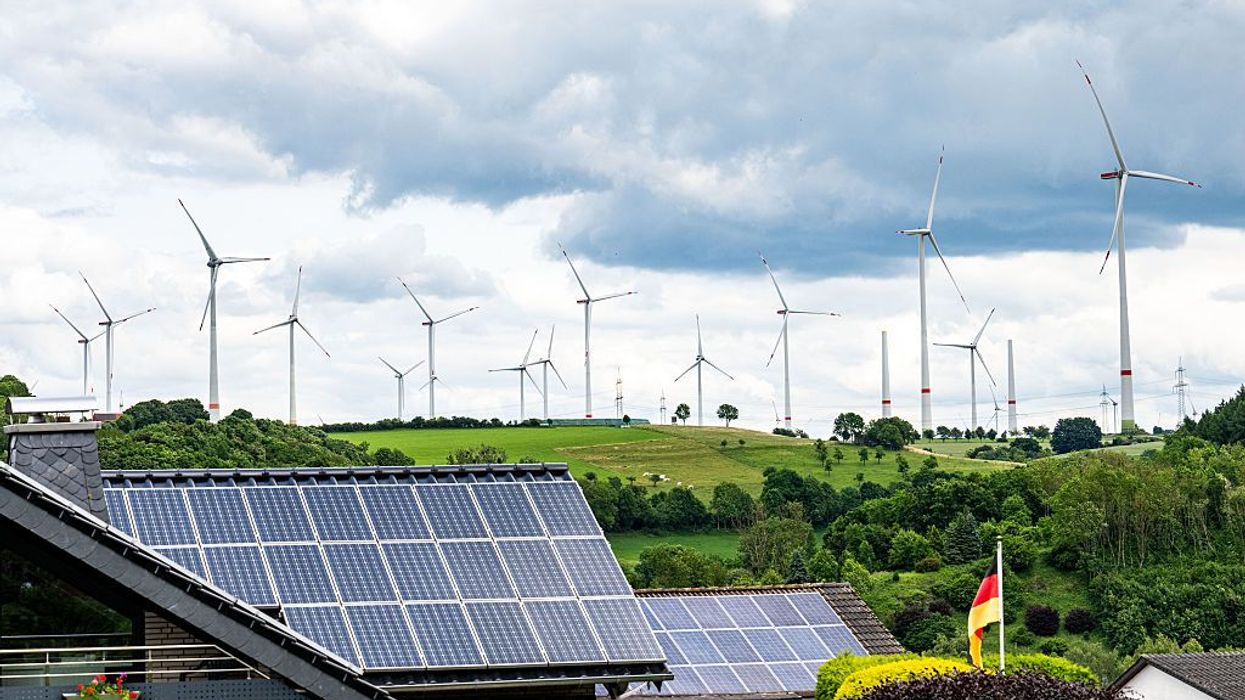April, 29 2015, 02:00pm EDT

For Immediate Release
Contact:
Adam Beitman, Sierra Club, adam.beitman@sierraclub.org or 202-670-5585
Southeastern Pennsylvania Earns Failing Grades for Dangerous Air Pollution
Lung Association report highlights need for stronger state protections from smog pollution
PHILADELPHIA
Counties throughout Southeastern Pennsylvania received failing grades for air quality last year, according to figures released today by the American Lung Association. The findings highlight the need for strong clean air safeguards from the Brunner Island coal-fired power plant, which is the largest coal-fired power plant near Harrisburg, York, Lancaster, and Philadelphia.
In the American Lung Association's 2015 State of the Air report, which grades each county in the United States based on its levels of smog and soot pollution, thirteen counties earned a failing grade for smog pollution, including Bucks, Chester, Delaware, Lancaster, Lebanon, Philadelphia, and York Counties in Southeastern Pennsylvania. Dauphin, Berks, and Montgomery County each scored a D.
"Pennsylvania families deserve better than failing air quality grades. Today's report from the American Lung Association highlights the need for Pennsylvania to do more to protect its families from dangerous air pollution," said Tom Schuster, Senior Representative for the Sierra Club's Beyond Coal campaign in Pennsylvania.
Two thirds of Pennsylvania residents live in areas that are already failing to meet the current smog standard, including more than 1.2 million seniors, 1.7 million children, and nearly 750,000 asthma sufferers in Pennsylvania whose health is put at risk from smog pollution. In addition, people of color in Pennsylvania suffer from even higher rates of asthma and asthma-related hospitalizations, and are more likely to live in areas with higher levels of smog pollution.
This news comes as Governor Tom Wolf's Administration is working to finalize a new standard aimed at limiting smog-causing NOx pollution from coal-fired power plants, the largest source of this type of pollution in the state. Unfortunately, the proposed rule would not require any pollution reductions from the Brunner Island coal-fired power plant outside Harrisburg, which is the only remaining large coal-fired power plant in the state that does not have modern pollution controls to limit dangerous smog-causing pollution.
"Today, smog-causing pollution from the Brunner Island coal-fired power plant pours out of its smokestacks unabated, endangering the health of families throughout our region and directly contributing to today's failing air quality grades. The people of southeastern Pennsylvania have a right to breathe healthy air like everyone else," said retired military veteran and Sierra Club Veterans for Clean Air volunteer Sgt. Gerald Brown. "While we applaud the Governor's proposal to reduce pollution from other coal plants in the state, Brunner Island should not be given a free pass to pollute in our region and endanger the health of our families. It's time for Governor Wolf to close this dirty coal loophole and put our region on a path towards cleaner air, clearer skies, and healthier families."
Smog (also known as ground-level ozone) is pumped out of vehicle tailpipes and dirty power plants, and doctors compare inhaling smog to getting a sunburn on your lungs. According to the American Lung Association, breathing in smog pollution often results in immediate breathing trouble and long-term exposure is linked to chronic respiratory and lung diseases like asthma, reproductive and developmental harm, and even premature death.
The Sierra Club is the most enduring and influential grassroots environmental organization in the United States. We amplify the power of our 3.8 million members and supporters to defend everyone's right to a healthy world.
(415) 977-5500LATEST NEWS
‘Who Will Be in Charge?’ Sanders Warns of AI Future Dominated by Handful of Billionaires
"Are we comfortable with seeing these enormously wealthy and powerful men shape the future of humanity without any democratic input or oversight?" asked Sen. Bernie Sanders.
Dec 09, 2025
US Sen. Bernie Sanders said Monday that policymakers in the United States and around the world are at a critical juncture where they must decide whether artificial intelligence will be controlled and exploited by the ultra-wealthy—or utilized for the benefit of all humanity.
In a speech on the floor of the US Senate, Sanders (I-Vt.) said the key question is, "Who will be in charge of the transformation into an AI world?"
"Currently, a handful of the wealthiest people on Earth—people like Elon Musk, Jeff Bezos, Bill Gates, Mark Zuckerberg, Peter Thiel, and others—and others are investing many, many hundreds of billions of dollars in developing and implementing AI and robotics," the senator said. "Are we comfortable with seeing these enormously wealthy and powerful men shape the future of humanity without any democratic input or oversight?"
Watch the full speech:
Sanders noted that US President Donald Trump "is strongly supporting" billionaire dominance of burgeoning AI technology, including with his plan to sign an executive order aimed at blocking state-level regulations of the artificial intelligence industry.
"Does this elite group of some of the most powerful people on Earth believe that they have the divine right to rule?" the senator asked.
Sanders also emphasized the potentially catastrophic impact of AI technology on workers, as Amazon and other corporate giants seek to replace as many jobs as possible with robots. In October, Sanders released a report estimating that advances in AI technology could supplant nearly 100 million US jobs over the next decade, including 89% of fast food workers and 40% of registered nurses.
"If AI and robotics eliminate millions of jobs and create massive unemployment, how will people survive if they have no income? How do they feed their families, pay for housing, pay for healthcare?" Sanders asked. "That might be an issue that we should be talking about, like, yesterday."
In recent weeks, Sanders has made burgeoning AI technology and its concentration in the hands of a few powerful individuals and corporations a major focus, holding an event with computer scientist Geoffrey Hinton—who is known as the "godfather of AI"—and warning about the promise and peril of artificial intelligence in the pages of major newspapers.
"AI and robotics are revolutionary technologies that will bring about an unprecedented transformation of society," Sanders wrote in a Guardian column last week. "Will these changes be positive and improve life for ordinary Americans? Or will they be disastrous? Congress must act now."
Keep ReadingShow Less
UN Report Estimates Bold Climate Action Would Deliver $100 Trillion in Benefits by 2100
"If we choose to stay on the current path—powering our economies with fossil fuels, extracting virgin resources, destroying nature, polluting the environment—the damages would stack up."
Dec 09, 2025
A new report from the United Nations Environment Program has found that addressing the global climate emergency would deliver major economic benefits, in addition to creating a cleaner and more habitable planet.
The seventh edition of the Global Environmental Outlook (GEO), released on Tuesday, estimates that making up-front investments in climate action now would begin to yield global macroeconomic benefits starting in 2050, potentially growing to $20 trillion per year by 2070 and $100 trillion by 2100.
The report, which was the product of nearly 300 multi-disciplinary scientists across more than 80 countries, argues that a total of $8 trillion in annual investment from this year until 2050 would be needed to achieve its climate goals. But, the report stresses, the cost of inaction would be far greater.
"If we choose to stay on the current path—powering our economies with fossil fuels, extracting virgin resources, destroying nature, polluting the environment—the damages would stack up," the report warns. "Climate change would cut 4% off annual global GDP by 2050, claim many lives, and increase forced migration."
Other likely consequences of inaction, warns the report, include "Amazon forest dieback and ice-sheet collapse," along with the loss of "hundreds of millions more hectares of natural lands." The report also projects that global food availability will fall if the climate crisis is not addressed, and that increased air pollution will cause an additional 4 million premature deaths per year.
The report recommends a rapid move away from fossil fuels, as well as a drastic rethinking of agricultural subsidies so that they no longer "directly favor activities that have significant harmful effects on the environment, including on biodiversity."
Robert Watson, a co-chair of the GEO assessment, said in an interview with the Guardian that the climate crisis cannot simply be seen as an environmental issue given that it is now "undermining our economy, food security, water security, human health," and also creating national security problems by increasing "conflict in many parts of the world."
In an interview with BBC, Watson also accused US President Donald Trump's administration of sabotaging the report by refusing to even accept its conclusions about the damage being done by human-induced climate change.
"The US decided not to attend the meeting at all," he explained. "At the very end they joined by teleconference and basically made a statement that they could not agree with most of the report, which means they didn't agree with anything we said on climate change, biodiversity, fossil fuels, plastics, and subsidies."
Keep ReadingShow Less
Report Exposes Instacart's Hidden AI Price Experiments That Could Cost Families $1,200 Per Year
"At a time when everyday Americans are struggling with high prices, it is particularly egregious to see corporations secretly conducting individual experiments to see how much a person is willing to pay," said one advocate.
Dec 09, 2025
Consumer advocates on Tuesday called on the Federal Trade Commission and state officials to investigate artificial intelligence-enabled pricing experiments used by Instacart, the grocery shopping app millions of Americans rely on, that charge up to 23% more for some shoppers than others when they buy the same item at the same store.
Consumer Reports joined the advocacy group Groundwork Collaborative and the labor-focused media organization More Perfect Union to uncover Instacart's pricing experiments enabled by Eversight, an AI pricing software that Instacart acquired in 2022. The company's CEO said last year that the experiments have helped the company “to really figure out which categories of products our customers [are] more price sensitive on"—in other words, to tailor prices based on a customer's shopping habits, whether they're near a competing store, and other factors.
The groups' study, Same Cart, Different Price, describes how researchers ran five tests with 437 participants, studying the prices of a basket of items bought at two Target stores and three Safeway stores using Instacart.
In one test at a Safeway in Washington, DC, shoppers logged on to the app to buy a carton of eggs from the same brand at the same time and found that the price they were given varied widely. Some shoppers were charged just $3.99 for the eggs, while others saw a price as high as $4.79—20% higher.
Shoppers at a Safeway in Seattle saw a 23% difference in prices for Skippy peanut butter, Oscar Mayer turkey, and Wheat Thins crackers. At two different Safeways in Washington, DC, Instacart quoted shoppers at one store a price that was 23% higher than at another for Signature Select Corn Flakes.
"It’s time for Instacart to close the lab. Americans shopping for groceries aren’t guinea pigs and shouldn't have to pay an Instacart tax.”
For the same basket of groceries, shoppers at the Seattle store were asked to pay as much as $123.93, while others were charged just $114.34.
"The average price variations observed in the study could cost a household of four about $1,200 per year," said Groundwork.
Justin Brookman, director of tech policy at Consumer Reports, said Instacart's tactics "hurt families who are simply trying to purchase essential groceries."
"At a time when everyday Americans are struggling with high prices, it is particularly egregious to see corporations secretly conducting individual experiments to see how much a person is willing to pay," said Brookman. "Companies must be transparent and upfront with people about pricing, so that they can make informed choices and keep more of their hard-earned money. We encourage the Federal Trade Commission and state attorneys general to investigate Instacart’s pricing tactics."
Groundwork noted that Instcart's website acknowledges that it runs price tests, but states that "shoppers are not aware that they’re in an experiment" and are having their grocery prices selected for them via algorithm.
While Instacart has claimed its price experiments are "negligible," the groups emphasized that they're being used "against the backdrop of the fastest increase in food prices since the late 1970s."
After previous reporting on companies' use of "shrinkflation," "dynamic pricing," and other practices that keep prices high even as pandemic-era labor and supply chain issues have subsided, "today’s report shows Instacart’s experiments are yet another way corporate pricing tactics are squeezing American families," said Groundwork.
The study did not find evidence that Instacart is giving shoppers different prices based on their ZIP code or income, as companies like Amazon, Delta Air Lines, and Home Deport have been accused of doing.
But the groups said Eversight gives the company the capability to use that data to make pricing decisions tailored to particular shoppers.
“Instacart is quietly running pricing experiments on millions of shoppers during the worst grocery affordability crisis in a generation, and it’s costing households as much as $1,200 a year,” said Groundwork Collaborative executive director Lindsay Owens. “They have turned the simple act of buying groceries into a high-tech game of pricing roulette. When the same box of Wheat Thins can jump 23% in price because of an algorithm, that’s not innovation or convenience, it’s unfair. It’s time for Instacart to close the lab. Americans shopping for groceries aren’t guinea pigs and shouldn't have to pay an Instacart tax.”
The groups credited some state and federal lawmakers who have begun to take notice of pricing practices like Instacart's; US Rep. Greg Casar (D-Texas) introduced the Stop AI Price Gouging and Wage Fixing Act in July with the aim of prohibiting the use of automated systems to set prices. New York has enacted the first-of-its-kind Algorithmic Pricing Disclosure Act, which requires companies to prominently disclose to customers, "This price was set by an algorithm using your personal data" when they use methods like Instacart's. Other state legislation has been introduced in Colorado, California, and Pennsylvania to ban the use of surveillance to set prices.
The groups called on the FTC to take action under Section 5 of the Federal Trade Commission Act, which bans "unfair methods of competition." Those could include “'price discrimination not justified by differences in cost or distribution,' which appears to match Instacart’s pricing experiments and fluctuations," the report reads.
The FTC could also bring enforcement cases or initiate rulemaking to officially label AI-enabled pricing strategies as an "unfair or deceptive practice," affirming that companies who use them are breaking a consumer protection standard.
"Fair and honest markets are the bedrock of a healthy economy," reads Tuesday's report. "Companies like Instacart offer great convenience, but they are increasingly pursuing corporate pricing practices that unfairly decouple the price of a product from its true cost. As more consumers learn about, and decry, these practices, perhaps companies will change course. But if they do not, policymakers should intervene and require them to change their practices."
Keep ReadingShow Less
Most Popular


